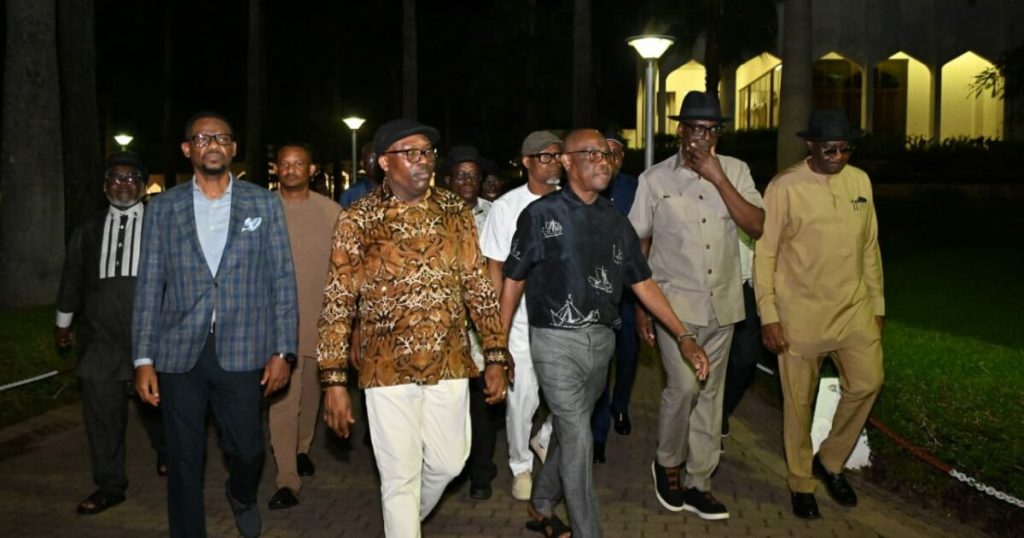Paragraph 1: The Genesis of the Rivers State Crisis
The political landscape of Rivers State has been marred by a prolonged crisis, culminating in a state of emergency declared by President Bola Tinubu on March 18, 2025. The declaration resulted in the suspension of Governor Siminalayi Fubara, his deputy, Ngozi Odu, and the entire state House of Assembly. President Tinubu attributed this drastic measure to escalating insecurity within the state and the perceived inability of the state government and legislature to cooperate effectively in addressing the challenges. This intervention signaled a significant disruption to the political processes in Rivers State and set the stage for a complex and delicate process of reconciliation.
Paragraph 2: The Abuja Meeting: A Step Towards Reconciliation?
In a bid to address the ongoing political impasse in Rivers State, President Tinubu convened a crucial meeting at the Presidential Villa in Abuja on Thursday. The meeting brought together key stakeholders in the Rivers State political arena, including the suspended Governor Fubara, Minister of the Federal Capital Territory Nyesom Wike, Speaker of the suspended House of Assembly Martins Amaewhule, and other members of the state legislature. This high-level gathering signaled the President’s commitment to finding a resolution to the crisis and restoring stability to the state’s governance. The presence of both Fubara and Wike, figures with potentially divergent interests, underscored the complexity of the situation and the need for a comprehensive approach to reconciliation.
Paragraph 3: Exploring the Dynamics of the Crisis and Potential Solutions
The details of the closed-door meeting remain undisclosed, but it is widely believed that the discussions centered around finding common ground and charting a path towards restoring normalcy in Rivers State. The escalating insecurity, which prompted the President’s initial intervention, likely featured prominently in the deliberations. Furthermore, the alleged breakdown in cooperation between the executive and legislative branches of the state government, a key factor in the President’s decision to declare a state of emergency, likely required careful consideration. The meeting served as a platform for the involved parties to articulate their concerns and explore potential solutions to the multifaceted challenges plaguing the state.
Paragraph 4: Signs of Thaw and the Path Ahead
Photographs released from the Presidential Villa offered a glimpse into the atmosphere of the meeting, depicting President Tinubu, Governor Fubara, Minister Wike, and the lawmakers engaged in discussions. Further images of Fubara and Amaewhule holding hands and sharing laughter after a separate meeting suggest a potential easing of tensions between the suspended Governor and the Speaker. While these visual cues offer a sense of optimism, the path to a full resolution remains intricate. The underlying issues that led to the crisis necessitate in-depth dialogue and a commitment from all parties to work towards a sustainable and peaceful resolution.
Paragraph 5: The Importance of Dialogue and Compromise
The Abuja meeting represents a crucial first step in the process of reconciliation and rebuilding trust among the key political actors in Rivers State. The willingness of the involved parties to engage in dialogue signifies their recognition of the urgent need to address the prevailing crisis and work towards a stable and functional government. Successful resolution hinges on the ability of all sides to compromise, prioritize the interests of the people of Rivers State, and establish mechanisms for effective communication and collaboration moving forward.
Paragraph 6: Looking Towards the Future of Rivers State
The outcome of the meeting and subsequent negotiations will have a profound impact on the future of Rivers State. The restoration of a fully functioning government is essential for addressing the pressing security challenges and ensuring the delivery of vital services to the people. The ability of the key political players to overcome their differences and forge a united front will be critical in fostering an environment conducive to peace, stability, and progress in the state. The nation watches with keen interest as Rivers State navigates this challenging period, hoping for a resolution that reinforces democratic principles and promotes the well-being of its citizens.


